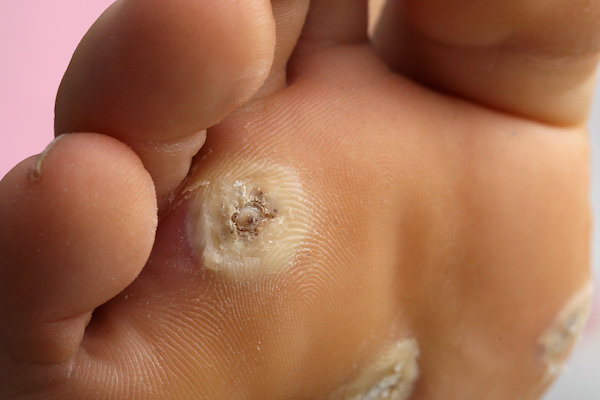What are plantar warts?
Plantar warts are small, rough growths that develop on the soles of the feet due to a viral infection in the outer layer of the skin. They often appear on weight-bearing areas, such as the heels or balls of the feet, and may cause pain or discomfort when walking. These warts are caused by the human papillomavirus (HPV) and can sometimes be mistaken for corns or calluses.
What causes plantar warts?
Plantar warts are caused by HPV, which can enter the skin through tiny cuts or abrasions on the feet. The virus thrives in warm, moist environments, such as locker rooms, public showers, and swimming pools. While not everyone exposed to HPV develops warts, certain factors increase the likelihood of infection.
Common risk factors
Several factors can make a person more prone to developing plantar warts, including:
- Walking barefoot in public places like pools, gyms, and locker rooms
- Having cuts, cracks, or weakened skin on the feet
- A weakened immune system due to illness or medication
- Frequenting environments where HPV is present
Are plantar warts contagious?
Yes, plantar warts are contagious and can spread through direct or indirect contact with HPV. The virus can spread by touching a surface that is infected. It can also spread by sharing personal items like towels or shoes. Scratching an existing wart can also transmit the virus.
To prevent spreading warts, avoid walking barefoot in communal areas and keep your feet clean and dry.
How do you to treat plantar warts?
Plantar warts can sometimes go away on their own, but persistent or painful warts may require professional treatment. Over-the-counter remedies can be slow and ineffective, while professional options offer faster relief. Volunteer Podiatry provides advanced wart treatments, including:
- Cryotherapy (freezing the wart with liquid nitrogen)
- Prescription-strength topical treatments
- Minor surgical procedures for stubborn warts
When is it time to see a podiatrist?
Consult a podiatrist if a foot growth is painful, bleeding, or changing in shape or color. Seek care if home treatments fail, the growth returns or multiplies, or if pain affects daily activities. People with diabetes, neuropathy, or weak immune systems should see a specialist right away – this includes those on certain medications or with conditions like HIV/AIDS.
If you’re unsure whether the growth is a wart or another condition, Volunteer Podiatry can provide an expert diagnosis and treatment.

